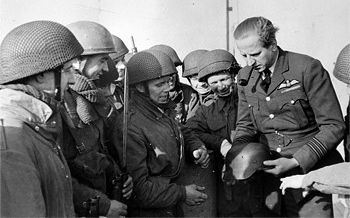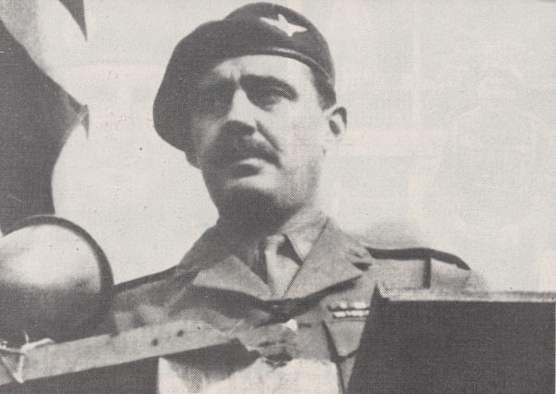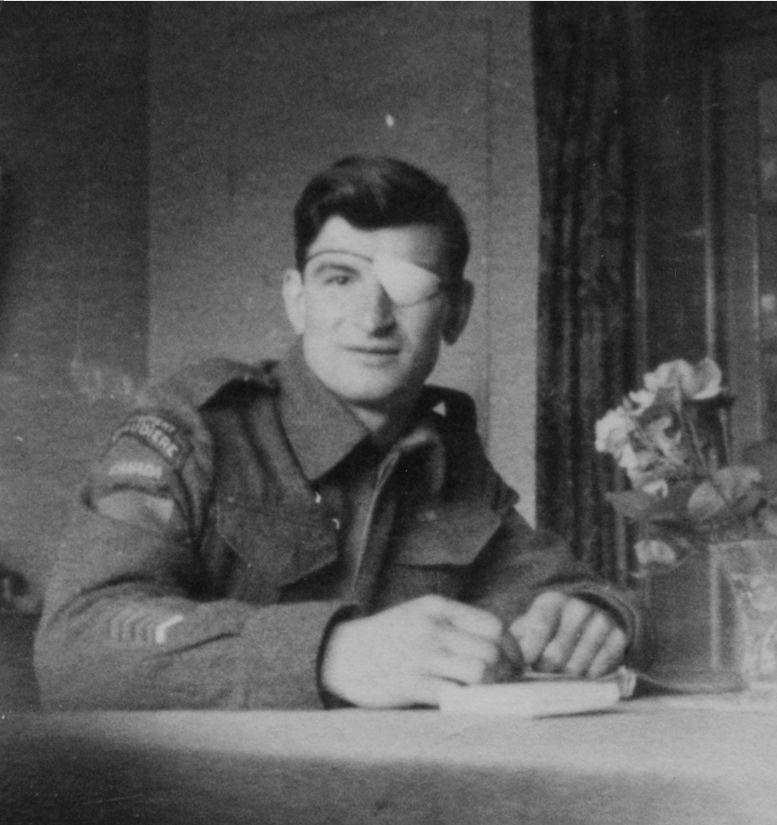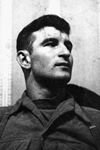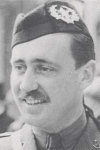I Was There! - 'Inside Ten Minutes the Beach Was in Our Hands'
The War Illustrated, Volume 5, No. 124, Page 574-575, March 20, 1942.
The following account of the British parachute raid on the German radio-location station at Bruneval, near Havre, was given by Reuter's Special Correspondent, who accompanied the expedition in a "combined operations" ship.
For some days all those who took part had waited. Training and rehearsals had been completed. Everything was satisfactory, and all that was needed were the right conditions. Since the Navy, the Army and the R.A.F. each had vital parts to play, weather conditions to suit all services were necessary – little or no wind for the parachutists, good visibility for the R.A.F. and the right tide for the Navy. In winter few days can fulfil all those conditions.
As each day passed, so spirits sank in the wardroom of the ship in which I had lived during the final training and rehearsal for the parachute troops and the light landing craft. Then glumness and depression were rapidly transformed into jubilation when word came round late on Friday afternoon (Feb. 27): "The job's on tonight."
The sun shone brilliantly from a clear sky when the naval flotilla sailed to the cheers of other craft. As the pastel shades of the sky darkened into night the escorting craft faded into vague shapes distinguishable only by their wake – a silver streak in the light of the moon.
While the flotilla steamed steadily to the French coast, those who were to man the landing craft blacked their faces with burnt cork and paraded the wardroom in sheer high spirits, giving imitations of well-known black-faced comedians.
We were well within "enemy waters" when the light landing craft left the mother ship and went on with the escort. Just before leaving, echoing through the ships, came the stirring melody "Land of My Fathers", sung by the Welshmen who formed a large part of the soldiers' protection crews. Small, undefenceless though the landing craft seemed, yet stowed away within them were guns and ammunition sufficient to deal hardly with either air or E-boat attack.
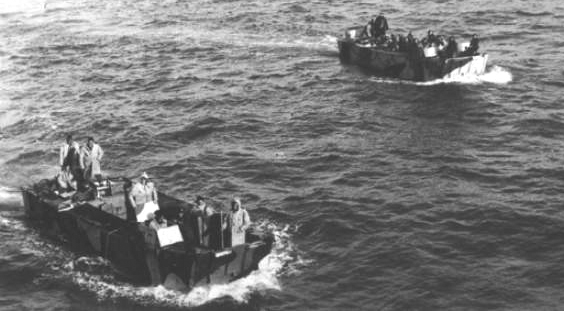 The Bruneval Raid, an account of which is given in this page, was a highly successful essay in Services cooperation. Seen here returning after the attack, these landing craft held a military escort which covered the operations of the parachutists from seaward. More photos are in page 573. Photo, British Official: Crown Copyright.
The Bruneval Raid, an account of which is given in this page, was a highly successful essay in Services cooperation. Seen here returning after the attack, these landing craft held a military escort which covered the operations of the parachutists from seaward. More photos are in page 573. Photo, British Official: Crown Copyright.
With all guns shelling, the craft could bristle arms like a porcupine quill. Also on board were duffle coats for the parachute troops on the way back, bully-beef, biscuits, and condensed milk, large reserves of petrol and a jar of jam.
I stood in the bow of the ship and watched the craft slowly merging into the silver greyness of the far distance. Beside me stood a member of the gun crew whom I recognized as one of the wardroom stewards – an unfailingly cheery man who had a slang description for nearly every dish. Up to then I had only seen him as a dexterous waiting steward. Yet there he stood, looking with envious eye at the departing flotilla. His attitude was typical of those who had to stay behind. "I'd give a quid to be going with you", said one lad, while persuasive attempts to stowaway were also made. For us, it was anti-climax. We had to wait now till it was all over. But at that very moment all was activity on the aerodromes, where the parachute troops were climbing into the Whitley bombers which were to drop them.
The R.A.F. timing was excellent. They found their spot at exactly the right moment, and from only a few hundred feet the parties of paratroops were landed in a few minutes. The Air Force was also in at the end of the operation. As dawn took away the protective cover of darkness from the returning craft, the R.A.F. threw over them a powerful "umbrella" of fighters. "It was lovely to see half the British Air Force swooping round us", said one parachutist officer when we got back.
All the crews of the aircraft which dropped the parachutists came to the ship to await the return of the parachute troops. The commander of the squadron was pointed out to me. He stood in the wardroom in a manner known to millions, with his fair hair smoothly brushed, with his head held slightly back and rather to one side – the pilot of "F" for Freddie in "Target for Tonight". The Air Force men had a strong Empire flavour. There were seven Canadians, some New Zealanders and one Australian in the dark blue of the R.A.A.F.
Later, Reuter's Special Correspondent received first-hand reports of the operation itself. This is what he wrote:
A charge led by a Seaforth Highlander sergeant proved the turning-point in the raid by British paratroops on the French coast at Bruneval, 12 miles north of Havre, in the early hours of the morning of Feb. 28. The purpose of the raid – the destruction of a valuable German radio location post – had been achieved, the Navy waited off shore, yet still the Germans held the approach to the beach. The party attacking the beach had been pinned down for some time by accurate machine-gun fire from the beach fort, the minimum time expected for the raid had already expired, danger to the paratroops themselves grew as each minute passed, danger equally increased for the light Naval craft.
Then above the noise of firing could be heard the shouts of the Seaforths, "Cabar Feidh", indicating that one party of paratroops, which had been dropped a little off the mark, had joined up with the main force and was now coming into action. ("Cabar Feidh" is one of the Seaforth Highlanders' mottoes and is Gaelic for "Antlers of the Deer".)
"Inside ten minutes", said Captain John Ross, the second in command, "the beach was in our hands". The Germans holding the fort had all either been killed or captured, or had fled to a near-by wood.
Captain Ross, who emphasized what a complete surprise the raid was to the Germans, said he was sure that right up to the end they did not really know what was happening. At no time did they hold the least initiative, and though they fought well so long as they held the attackers off, "when it came to fighting at close quarters they gave in".
This remark was echoed by most of the paratroop officers. The Germans were stubborn when behind cover and in a good position, but if suddenly confronted at a distance of only a few yards – and much of the fighting was done at no greater range – they generally turned and ran.
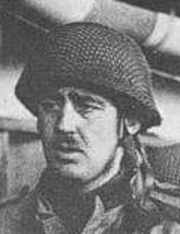 Major J. D. Frost, who commanded the parachute descent force in the Bruneval raid described below. Photo, British Official.
Major J. D. Frost, who commanded the parachute descent force in the Bruneval raid described below. Photo, British Official.
The commanding officer, Major J. D. Frost, told me that his men "did excellently". He went on: "On the way across in the planes, you would never have thought it was an operational flight. It was more like a joy ride. Every machine, I think, had its own concert party. It was by no means so frightening as everybody had expected. You sat at the hole, looked down and saw a few tracer bullets go past below – and jumped."
The Germans, while still holding the beach fort, called out in excellent English "The boats are here", in the hope of misleading the paratroops into believing a Naval officer had shouted and getting them to chance a run for the beach under machine-gun fire.
Both Major Frost and Captain Ross had nothing but praise for the R.A.F. "They put us down ten yards from where we wanted to be", said Ross, "and within two minutes of leaving the plane the troops were armed, organized and ready to fight".
"The real hero", said the Major, "was the officer commanding the section which was dropped away from the bulk of the troops". Only 20, the youngest officer of the part, and therefore known as "Junior", he had to find his way, frequently under fire, in an area quite unknown to him. When "Junior" took his first look around and failed to recognize any familiar landmark he knew he was lost.
"I don't think there's any feeling quite so unpleasant as suddenly finding yourself in enemy territory and not knowing where you are", he said. "Then I saw another plane going along low down and I knew in which direction to go, and after a while I saw the lighthouse. Then everything was all right."
"For the whole two hours or more of the operation there was never a moment when some firing was not going on. Yet nowhere did I see any sign of life in the houses. Two of my men went through a village, but there were no lights, no furtive peering by the edges of curtains."
It was a former Fleet Street man, 22-year-old Lieutenant Peter Young, who was assigned the task of dealing with the radio-location post, and so complete was the surprise of the attack that he had almost reached his objective before encountering any opposition. The German sentry challenged the approaching troops twice and then fired. The paratroops, who had held their fire as long as possible, "rubbed hum out", said Lieutenant Young. "After that we hunted them out of cellars, trenches and rooms with hand grenades, automatic weapons, revolvers and knives."
"Most were killed, but some ran away, and one tried to hide over the edge of the cliff. Having got there, he wanted to surrender, and I looked over to see him with his hands up. At the time I thought I had seen nothing funnier than a German trying to scramble up the lip of a cliff with his hands up."
The post being captured, it was the turn of the sappers. Their task was to destroy the apparatus; and destruction could scarcely have been more complete. To the sappers also fell the duty of searching the beach for mines and laying anti-tank mines.
One of the parachutists told me they got away just in time. "The Germans had an armoured division about 50 miles away, and as we left the beach I saw a column of headlights coming towards us, though still some distance off", he said.
When the Verey signal flashed, the Naval craft came in "like a swarm", took the men on board and were steaming back to England in a surprisingly short time.
Previous and next article from I Was There!
I Was There! - Grim Was Our Flight From the Doomed City
The majority of the British women and children were evacuated from Singapore before the final Japanese assault. From The Daily Mail correspondent, Cedric Salter, came this impression of the scene on o
I Was There! - We Went With the Raiders to St. Nazaire
Supplementing the official story on St. Nazaire (see page 627), here are eye-witness accounts by Gordon Holman, Reuter's and Exchange Telegraph correspondent, and men who participated in the operation
Index
Previous article
Our Parachutists Led the Way at Bruneval
Wing-Com. Pickard, D.S.O., D.F.C., the leader of the R.A.F. carrying force of bombers which took part in the raid, examines a captured German steel helmet. Photos, British Official: Crown Copyright.
Next article
Fierce and Bloody Battle in the Java Sea
The Battle of the Java Sea was heavy defeat for the United Nations, since all but one of the thirteen warships of the Allied squadron that went into action against the Japanese were sent to the bottom


